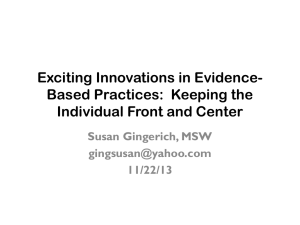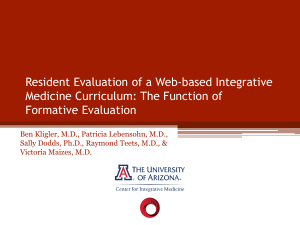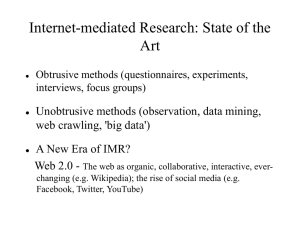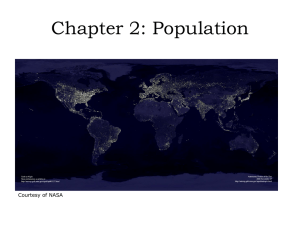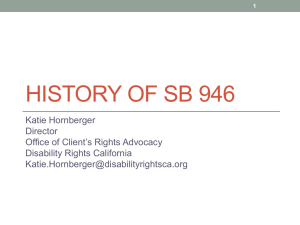International Marketing Research- Process
advertisement
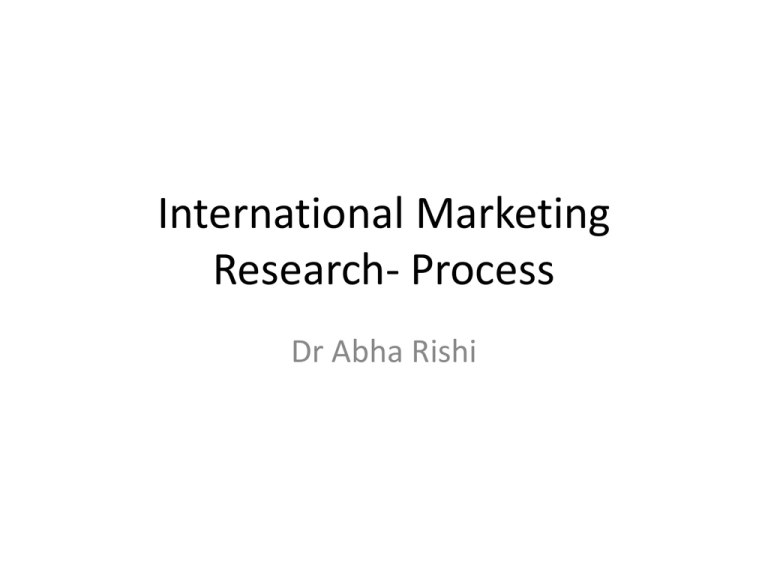
International Marketing Research- Process Dr Abha Rishi The International Marketing Research Process • Any research starts off with a precise definition of the research problem(s). • In an international context, the marketing research problem formulation is hindered by the self-reference criterion (SRC). • A major difficulty in formulating the research problem is unfamiliarity with the foreign environment. • Omnibus surveys are regularly conducted by research agencies. • Once the research issues have been stated, management needs to determine the information needs. Dr Abha Rishi IMR Term 2 2 International Marketing Information Systems • Internal – Cos. Records of exports and imports – Trade dealings, Trend forecasting – Customer surveys • External – Govt. agencies, Embassies and High Commissions – International Orgns. – WTO, UN, ESCAP ( UN Economic and Social Commission for the Asia And the Pacific) – Specialized private agencies Determining Research Administration • Centralized – The research specifications are designed by the home office and forwarded to country operations for implementation. • Coordinated – An intermediary such as an outside research agency brings headquarters and country operations together. • Decentralized – Corporate headquarters establishes the broad thrust of research and delegates design and implementation to the local countries. Tools for comparing countries • 1. Environmental scanning – Systematic assessment of external conditions that might affect a cos. operations • 2. Grids – Opportunity Risk Matrix The company decides on indicators (attributes) and weights them according to the importance to the company – Country Attractiveness- Company Strength Matrix Designing the Survey Questionnaire – Question format • Structured or unstructured. • Direct or indirect. • Ensure data equivalence. – Question content • Consider interviewee’s ability and willingness to answer. • Adapt questions to societal constraints. – Question wording • Use simple unambiguous words, terms and questions. • Check for errors using translation-re-translation approach and alternative wording for questions. • Pretest the survey. Research Techniques • Interviews – Knowledge persons are a valuable information resource (personal bias must be discounted). – Goal, obtain in-depth information instead of a wide variety of information. • Focus groups – Interaction within a group about a specific topic. – Ideal size, 7-10. • Observation – Observation results can be influenced by presence of the observer. • Surveys – Gather quantitative rather than qualitative information through personal or remote contact with the subject population. The International Marketing Research Process • STEP 1 Define the international research problem and agree on the research objectives – Exploratory Research – Descriptive Research – Causal Research • STEP 2 Set specific objectives Dr Abha Rishi IMR Term 2 8 The International Marketing Research Process, continued • STEP 3 Develop the International Research Plan • STEP 4 Define Information Sources – Secondary Data • Researchers must determine if the information is available, and, if so, how reliable it is • Internal data is useful only if company has collected similar info from relevant respondents in a country with similar environment Dr Abha Rishi IMR Term 2 9 Secondary Global Marketing Research • Secondary Data: Data/information which is already available. • Primary Data: When the information is not useful, or simply does not exist. • Selected Secondary Data Sources: Lexis/Nexis, FINDEX, National Trade Data Bank, U.S. Department of Commerce, Japan External Trade Organization (JETRO), OECD, IMF, The Economist Intelligence Unit (E.I.U.), ACNielsen Co, Taylor Nelsen Sofres, etc. Dr Abha Rishi IMR Term 2 10 Secondary Global Marketing Research • Problems with Secondary Data Research: – Accuracy of Data – Age of data – Reliability over Time – Comparability of Data • Triangulate • Functional or Conceptual Equivalence – Lumping of Data Dr Abha Rishi IMR Term 2 11 Secondary Data Constraints • Conceptual Equivalence – Concepts have different meanings in different cultural environments • Functional Equivalence – Products themselves may be used for different purposes in different country environments Dr Abha Rishi IMR Term 2 12 Secondary Data Constraints, continued Sources of reliable data: - World Bank - United Nations Development Program - Organization of Economic Cooperation and Development (OECD) - Euromonitor Dr Abha Rishi IMR Term 2 13 Primary Data • Information collected for a specific purpose, to address the problem at hand. – The costs of collecting primary data in foreign markets are likely to be much higher given the lack of an appropriate marketing research infrastructure Dr Abha Rishi IMR Term 2 14 Primary Data Research Approaches • Qualitative research has been particularly useful as a first step in studying international marketing phenomena. – Focus Groups – Observation • Constraints: Responses can be affected by culture, individuals may act differently if they know they are being observed. Dr Abha Rishi IMR Term 2 15 Primary Global Marketing Research • Survey Methods for Cross-Cultural Marketing Research: – Questionnaire Design • Conceptual and Functional Equivalence • Translation and Scalar Equivalence • Back Translation and Parallel Translation • Scalar Equivalence Dr Abha Rishi IMR Term 2 16 Primary Global Marketing Research – Sampling: A sampling plan consists of: • Sampling unit • Sample size • Sampling procedure – Contact Method (see Exhibit 6-5) • Mail • Telephone • Person-to-person interviews • Online Survey Methods (see Exhibit 6-6): – E-mail surveys – Random Web site surveys – Panel Web site surveys Dr Abha Rishi IMR Term 2 17 Sampling • Sometimes it is impossible to approach certain respondents directly • It is unacceptable to pose questions to some people in certain circumstances Consider: – conventions – tradition – religion – appearance – household hierarchies Dr Abha Rishi IMR Term 2 18 Primary Global Marketing Research – Collecting the Information • Issues of nonresponse • Courtesy bias • Social desirability bias • Redundancy (asking the same question in different ways) • Issues of ethnographic research Dr Abha Rishi IMR Term 2 19 Primary Data Research Approaches, continued • Quantitative research are more structured, involving either descriptive research approaches, such as survey research, or causal research approaches, such as experiments. – Content Analysis – Survey Research – Experimental Research • Constraints: Respondent factors, infrastructure factors Dr Abha Rishi IMR Term 2 20 Data Collection • STEP 5 Design Data Collection Instrument – Emic instruments measure phenomena specific to each culture. – Etic instruments measure the same phenomenon in different cultures. • Constraints: Translation; Instrument Reliability; Reluctance to answer certain questions Dr Abha Rishi IMR Term 2 21 Data Collection, continued • STEP 6 Decide on the Sampling Plan – Sample Unit – Sample Size – Sampling Procedure • STEP 7 Collect, Analyze, and Interpret Data Dr Abha Rishi IMR Term 2 22 Decision Support Systems for Global Marketing • A coordinated collection of data, systems, tools, and techniques, complemented by supporting software and hardware designed for the gathering and interpretation of business and environmental data Dr Abha Rishi IMR Term 2 23 4. Market Size Assessment • Method of Analogy – Longitudinal method of analogy • Trade Audit • Chain Ratio Method • Cross-Sectional Regression Analysis Dr Abha Rishi IMR Term 2 24 4. Market Size Assessment • When using market size estimates, keep the following rules in mind: – Use several different methods. – Don’t be misled by numbers. – Don’t be misled by fancy methods. – Do a sensitivity analysis by asking what-if questions. – Look for interval estimates with a lower and upper limit rather than for point estimates. Dr Abha Rishi IMR Term 2 25 Sales Forecasting • Sales Force Composite Estimates – Personal observations and expectations of the local sales force • Jury of Expert Opinion – Opinions of different experts about future demand • The Delphi Method – Experts to estimate market performance; findings are aggregated, and experts are queried again, in light of aggregate responses Dr Abha Rishi IMR Term 2 26 Delphi Studies • Delphi studies are a means for aggregating the judgements of a number of experts who cannot come together physically. • The Delphi technique is particularly valuable because it uses mail, fax, or electronic communication to bridge large distances and therefore makes experts accessible at a reasonable cost. Dr Abha Rishi IMR Term 2 27 Sales Forecasting, continued • Time Series and Econometric Models – Use data of past performance to predict future market demand • Analogy Methods – Estimation method that relies on developments and findings in markets - With similar levels of economic development, or - Where the product is in the same market development stage, or - In markets which share similar cultural characteristics Dr Abha Rishi IMR Term 2 28 Sales Forecasting, continued • Point of Sale Research Made with the help of store scanners, in markets where they are available Involve comprehensive store audits Dr Abha Rishi IMR Term 2 29 5. New Market Information Technologies • Major developments/innovations: – Point of sale (POS) store scanner data – Consumer panel data – Single source data – Shift from mass to micro marketing – Continuous monitoring of brand sales/market share movements – Scanning data are used by manufacturers to support marketing decisions. Dr Abha Rishi IMR Term 2 30 5. New Market Information Technologies – Scanning data are used to provide merchandising support to retailers. – Market research tools being developed to track the effectiveness of newer marketing mix vehicles such as the Internet- goal is to establish a “Nielsen rating” for websites similar to those for TV programming. – CATI (Computer-Assisted Telephone Interviewing) – CAPI (Computer-Assisted Personal Interviewing) - CATI/CAPI benefits include speed, accuracy, and the ability to steer data collection based on the response. Dr Abha Rishi IMR Term 2 31 6. Management of Global Marketing Research • Selecting a Research Agency: The following considerations should be taken into account while choosing agency: – Level of expertise – Qualifications – Track record – Credibility and experience – Client record • Coordination of Multi-Country Research: – Emic versus Etic dilemma Dr Abha Rishi IMR Term 2 32 6. Management of Global Marketing Research – The emic school focuses on the peculiarities of each country. – The etic approach emphasizes universal behavioral and attitudinal traits. – In cross-cultural market research, the need for comparability favors the etic paradigm with an emphasis on the cross-border similarities and parallels. – Several approaches may be used to balance these conflicting demands. Dr Abha Rishi IMR Term 2 33 Participants in Marketing Research Activities Information Users • General management • Planning • Marketing and sales managers • Product managers • Lawyers Information Suppliers: Inside Company Information Suppliers: Outside Company • Marketing research department • Research consultants • Sales analysis group • Marketing research suppliers • Accounting department • Advertising agencies • Corporate strategic planning Dr Abha Rishi IMR Term 2 34 Information suppliers and services Information Supplier Corporate Inhouse Supplier Structured (Independent Department Customized Services External Supplier Unstructured (one or more MR employees) Standardized Services Syndicated Services Field Services Branded Product/Services Selective Services Dr Abha Rishi IMR Term 2 35 Factors Influencing Choice of Information Supplier • Internal personnel may not have skills or experience • Outside help may be called to boost internal capacity in response to urgent deadline • Often it is cheaper to go outside Dr Abha Rishi IMR Term 2 36 Factors Influencing Choice of Information Supplier (Contd.) • Outside suppliers may have special facilities or competencies which would be costly to duplicate for a single study • Political considerations • Increased credibility of research used in litigation or in proceedings before regulatory or legislative bodies Dr Abha Rishi IMR Term 2 37

